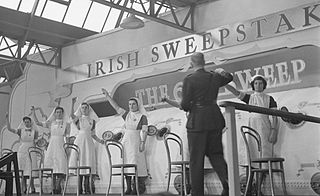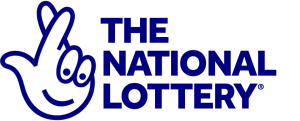The Robinson–Patman Act (RPA) of 1936 is a United States federal law that prohibits anticompetitive practices by producers, specifically price discrimination.

Competition is a rivalry where two or more parties strive for a common goal which cannot be shared: where one's gain is the other's loss. Competition can arise between entities such as organisms, individuals, economic and social groups, etc. The rivalry can be over attainment of any exclusive goal, including recognition.

The Federal Trade Commission (FTC) is an independent agency of the United States government whose principal mission is the enforcement of civil (non-criminal) antitrust law and the promotion of consumer protection. The FTC shares jurisdiction over federal civil antitrust law enforcement with the Department of Justice Antitrust Division. The agency is headquartered in the Federal Trade Commission Building in Washington, DC.

A lottery is a form of gambling that involves the drawing of numbers at random for a prize. Some governments outlaw lotteries, while others endorse it to the extent of organizing a national or state lottery. It is common to find some degree of regulation of lottery by governments. The most common regulation is prohibition of sale to minors, and vendors must be licensed to sell lottery tickets. Although lotteries were common in the United States and some other countries during the 19th century, by the beginning of the 20th century, most forms of gambling, including lotteries and sweepstakes, were illegal in the U.S. and most of Europe as well as many other countries. This remained so until well after World War II. In the 1960s, casinos and lotteries began to re-appear throughout the world as a means for governments to raise revenue without raising taxes.

Skill testing questions are a legal requirement attached to many contests in Canada.
In the United Kingdom, the football pools, often referred to as "the pools", is a betting pool based on predicting the outcome of association football matches taking place in the coming week. The pools are typically cheap to enter, and may encourage gamblers to enter several bets.

The Irish Hospitals' Sweepstake was a lottery established in the Irish Free State in 1930 as the Irish Free State Hospitals' Sweepstake to finance hospitals. It is generally referred to as the Irish Sweepstake or Irish Sweepstakes, frequently abbreviated to Irish Sweep or Irish Sweeps. The Public Charitable Hospitals Act, 1930 was the act that established the lottery; as this act expired in 1934, in accordance with its terms, the Public Hospitals Acts were the legislative basis for the scheme thereafter.
Publishers Clearing House (PCH) is an American company founded in 1953 by Harold Mertz. It was originally founded as an alternative to door-to-door magazine subscription sales by offering bulk mail direct marketing of merchandise and periodicals. They are most widely known for their sweepstakes and prize-based games which were introduced in 1967. From August 2020 to March 2024, they owned the Wide Open Media publications Wide Open Spaces, Wide Open Country, and FanBuzz.
American Family Publishers was an American company that sold magazine subscriptions. Founded in 1977, American Family Publishers (AFP) was one of America's leading marketers of magazine subscriptions. AFP was jointly owned by TAF Holdings, Inc. and a group of private investors. It is best known for running sweepstakes in which a large amount of money was offered as the grand prize. The winner was chosen at random, by a professional auditing company, from among all who responded to the sweepstakes, regardless of whether a magazine subscription was purchased or not.

A scratchcard is a card designed for competitions, often made of thin cardstock or plastic to conceal PINs, where one or more areas contain concealed information which can be revealed by scratching off an opaque covering.
A quiz channel is a television channel that focuses on phone-in quizzes. The quizzes usually focus on puzzles, such as filling in blanks, identifying subjects, or other forms of word puzzles. The channels make money by encouraging viewers to call a toll phone number for the chance to play.
The Louisiana Lottery Corporation (LLC) is a government-run lottery that is used to generate revenue without increasing taxes. The proceeds of the Lottery go to the Minimum Foundation Program that funds public education in Louisiana. The daily activities involved with running the cooperation are handled by the president of the Louisiana Lottery Cooperation. The president is under the supervision of the Lottery's nine-member governing board of directors.

The National Lottery is the state-franchised national lottery established in 1994 in the United Kingdom. It is regulated by the Gambling Commission, and is currently operated by Allwyn Entertainment Ltd, who took over from Camelot Group on 1 February 2024.

The National Lottery is the state-licensed lottery of Ireland. Established in 1986 to raise funds for good causes, it began operations on 23 March 1987 when it sold its first scratchcards. It launched the weekly drawing game Lotto the following year, holding the first draw on 16 April 1988. It now offers EuroDreams draws on Mondays and Thursdays, EuroMillions and Plus draws on Tuesdays and Fridays, Lotto and Lotto Plus draws on Wednesdays and Saturdays, and two Daily Million draws each day. Its other games include televised bingo, an annual Millionaire Raffle, and online instant-win games. The minimum age to play all National Lottery games is 18.
A sweepstakes parlor is an establishment that gives away chances to win prizes with the purchase of a product or service, typically internet access or telephone cards. They began to appear in the Southern United States some time around 2005, and quickly proliferated. Purchased entries are redeemed using computers at the establishment, which contain specialized software that presents whether a participant has won a prize. Results are often presented using mechanisms that resemble casino games, such as slots, and the facility itself may contain casino motifs in their overall decor.

A prize-linked savings account (PLSA) or lottery-linked deposit account is a savings account in which some of the interest payment on bank deposits or marketing dollars are distributed as prizes based on chance. They are attractive to consumers as they function both as a sweepstakes or game of chance and as savings vehicle. PLSAs are similar to lottery bonds, except they are offered by banks, credit unions, prepaid card companies, and financial technology companies, and they can be held for a period of time determined by the consumer. Sometimes the returns are in-kind prizes rather than cash.
Gambling has been present in the Philippines since at least the sixteenth century. Various legal and illegal forms of gambling are found almost all over the archipelago. The government manages gambling through the Philippine Amusement and Gaming Corporation (PAGCOR) a state-owned enterprise which both operates a number of individual casinos and in turn acts as a regulator to privately owned casino operators. Since 2016 PAGCOR has also granted operating licenses and overseen the regulation of growing online gambling sector serving offshore markets. Casino gambling and integrated resorts have become a key component of the Philippines appeal as a tourist destination with more than twenty casinos found in Metro Manila alone.
Omaze was an American for-profit fundraising company that partnered with charities in fundraising events. Omaze's events featured prizes, such as material goods, property, or celebrity experiences, usually with one grand prize and several lesser prizes. In order to enter the draw for the prizes, financial contributions were encouraged, with 15% to 60% of the money going to the partner charity.

The Betting and Lotteries Act 1934 was an Act of the Parliament of the United Kingdom and had three sections: Betting, Lotteries and Prize Competitions, and General.

In video game terminology, a loot box is a consumable virtual item which can be redeemed to receive a randomised selection of further virtual items, or loot, ranging from simple customization options for a player's avatar or character to game-changing equipment such as weapons and armor. A loot box is typically a form of monetisation, with players either buying the boxes directly or receiving the boxes during play and later buying "keys" with which to redeem them. These systems may also be known as gacha, which is popular in Japan, and may be integrated into gacha games.














